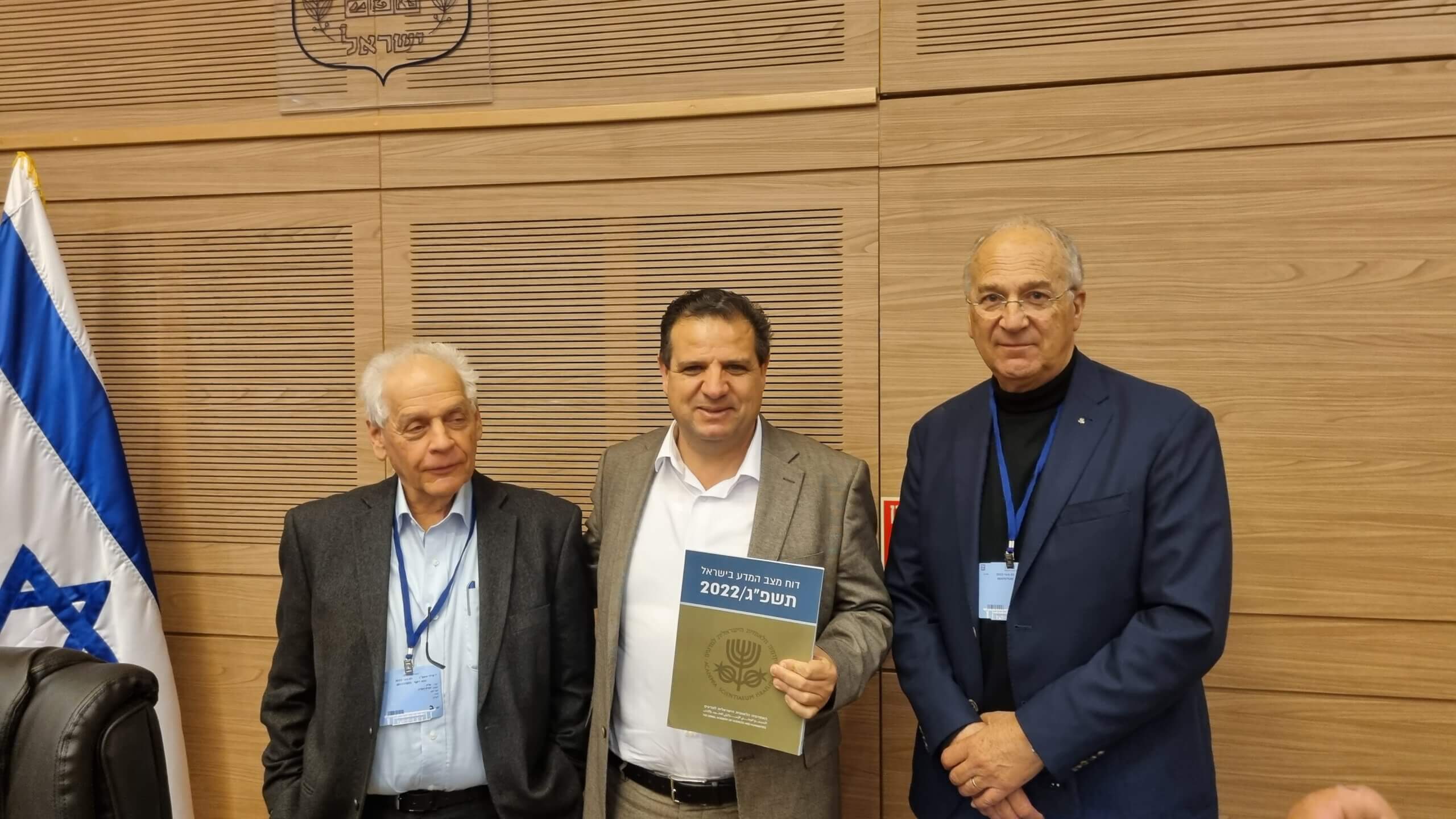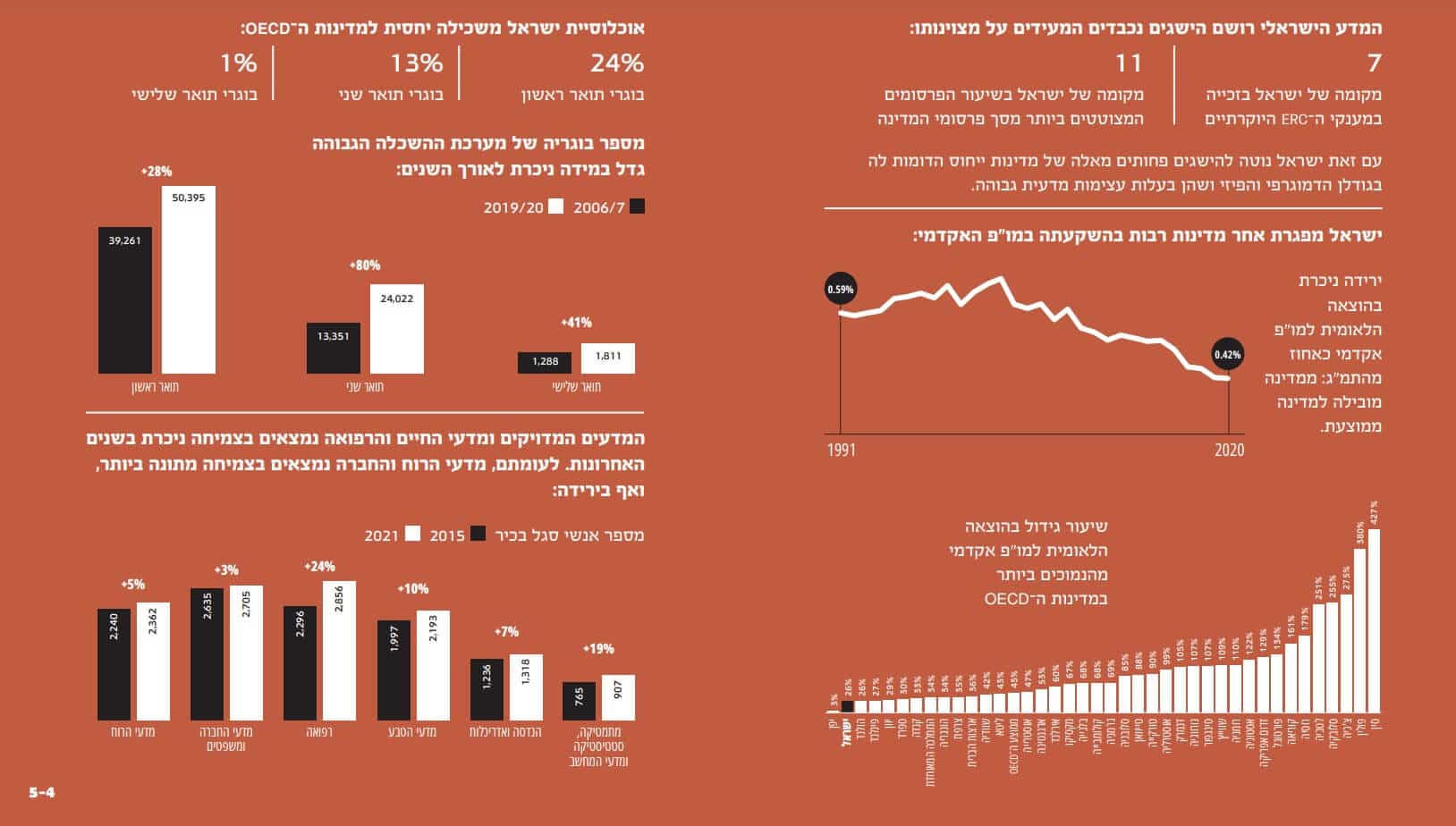This is one of the most prominent conclusions in the State of Science in Israel 2022 report published by the National Academy of Sciences, which was submitted today to the Knesset's Science Committee

Is there a flaw hidden behind the scientific success of glorious Israel that could bring it down?
The triennial report on the state of science, which is published as required by the Academy Law, reviews the state of science in the country, points out achievements, gaps and challenges, and is accompanied by recommendations for the advancement of scientific research in Israel.
A special committee and sub-committees under it worked on the preparation of the report for about two years. The twenty-three members of these committees are senior researchers in Israel from a variety of scientific fields. In their work, they met with dozens of officials in the higher education and scientific research system in Israel.
As mentioned, Israeli science records significant achievements that testify to its excellence both in the form of prestigious awards won by its researchers, both in the form of winning prestigious and competitive research grants on a global scale, and in the scientific impact of its publications as reflected in the number of their citations.
Nevertheless, despite this, Israel tends to achieve less than those of reference countries such as Switzerland, Singapore, Denmark, Sweden and Norway - which have a population similar in size to that of Israel, at least in the scope of the research output and its influence (expressed in citations) - which indicates the potential that lies The ability of Israel, as a relatively small country, to stand among the leading countries in world science.

Despite the real increase in funding allocated in Israel for academic R&D, Israel lags behind most OECD countries in this growth rate. Furthermore, in the last twenty years there has been a significant decrease in Israel's national expenditure on academic R&D as a percentage of GDP, which is reflected in Israel's transition from a leading country in this index to an average country. Against the background of the increasing competition in scientific activity in the world, all the more so when countries that until now did not operate in this arena began extensive scientific activity, as well as against the background of the increase in the number of senior faculty in Israel and the increase in demand for research budgets and grants, a considerable increase in the national investment in basic research is required to enable for Israel to maintain a leading and competitive position in world science and even improve it.
Such investment should focus on increasing the budgets directed to research grants and expanding the advanced research infrastructures available to Israeli researchers. Israel's population is relatively educated compared to the OECD countries, and the number of graduates of its higher education system has grown considerably over the years. However, only about half of the third degree graduates in Israel finally join the academic staff, which indicates the growth potential of scientific research in the country, both academically and industrially, considering the realization of the potential inherent in these graduates.
The fields that go up and the fields that go down
The exact sciences and the life sciences and medicine are experiencing considerable growth in recent years - mainly in the fields of mathematics and computer science, but also in others - as this is reflected in the increase in the number of senior faculty members in these fields, as well as in the number of graduates in these fields at all degree levels. In contrast, there is a very moderate growth, and even a decline, in the humanities and social sciences. These require finding a delicate balance between strengthening the academic staff in the fields of exact sciences and life sciences and medicine in order to promote Israel's scientific excellence in these fields at the same time as training quality personnel for the economy and preserving and nurturing research in the humanities and social sciences.
comments
Prof. David Harel, President of the Academy: "We are happy to submit the triennial report on the state of science in Israel to the Science and Technology Committee of the Knesset. This report on the state of science includes references to the natural sciences as well as the humanities and social sciences, and emphasizes the importance of expanding support in all these fields. At the time of its writing, the report could not have foreseen the events of the last few months and referred to them, and precisely for this reason it is important to emphasize that without maintaining the independence of the institutions of science, culture and the spirit, Israel's scientific achievements will go down the drain. The current report singles out for the first time a special and important reference to research in the academic colleges and calls for its cultivation. However, this is no reason to throw the baby out with the bath water: I am warning here against the attempt by the Minister of Education to appoint a college graduate as the vice chairman of the Council for Higher Education. The subject in this position is actually responsible for ensuring the scientific and academic quality in Israel, for example: to approve the establishment of study programs and higher education institutions and the allocation of research budgets. That is why it is important that the holder of this position be a scientist of equal or higher caliber from one of the research universities."
Prof. Rashef Tana, a member of the Academy who headed the committee that was entrusted with the preparation of the report: "The State of Science report engraves on its banner the importance of scientific excellence and examines ways to advance it. The report points to Israel's inferior situation compared to reference countries similar to it in terms of demographic and physical size and which have a high scientific intensity, such as Switzerland, Denmark, Norway and Sweden. Therefore, a significant increase in the national investment in basic research and the expansion of Israel's international scientific collaborations are required."
The full report can be found on the academy website.
You can watch the meeting of the Science and Technology Committee Knesset website.
More of the topic in Hayadan:
- Machine learning will advance all fields of science
- Prof. Dan Shechtman, Chairman of the Wolf Foundation: No party guarantees the restoration of scientific research in Israel and the prevention of brain drain
- Research: The decline in the quality of scientific research in Israel and the increase in social disparities will hinder growth

5 תגובות
Avi Blizovsky Singapore is a democracy? I wish we were like Singapore
A party regarding the reform whose proponent Yariv Levin admitted in an interview on Channel 14 that its implementation would turn Israel into a dictatorship
Why look at the glass half empty? The other side of the coin is that the yeshiva funding in Israel is the highest *in the entire galaxy*, and it is still going to increase in the next budget.
The academy got involved in politics when it took sides in the matter of reform... don't be surprised that now politics is getting involved in it...
"A significant decrease in the rate of spending on academic R&D in relation to GDP compared to Switzerland and Singapore"
is that so ? Maybe after all it's time for all surveyors who measure and compare to learn that
Israel is in the Middle East (not in Europe),
The structure of the population and its character is becoming more and more adjusted
to the geographical environment (not to Europe),
The mentality and the level of intelligence become similar
to the geographic neighbors (not to the Europeans),
Even if it's sad for those who want to match the Europeans
It is appropriate that they internalize the fact long ago
Not only are we not placed among the lions
But we are going "and progressing" to aim
The back of the foxes…